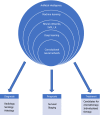Artificial intelligence and cholangiocarcinoma: Updates and prospects
- PMID: 35316928
- PMCID: PMC8894273
- DOI: 10.5306/wjco.v13.i2.125
Artificial intelligence and cholangiocarcinoma: Updates and prospects
Abstract
Artificial intelligence (AI) is the timeliest field of computer science and attempts to mimic cognitive function of humans to solve problems. In the era of "Big data", there is an ever-increasing need for AI in all aspects of medicine. Cholangiocarcinoma (CCA) is the second most common primary malignancy of liver that has shown an increase in incidence in the last years. CCA has high mortality as it is diagnosed in later stages that decreases effect of surgery, chemotherapy, and other modalities. With technological advancement there is an immense amount of clinicopathologic, genetic, serologic, histologic, and radiologic data that can be assimilated together by modern AI tools for diagnosis, treatment, and prognosis of CCA. The literature shows that in almost all cases AI models have the capacity to increase accuracy in diagnosis, treatment, and prognosis of CCA. Most studies however are retrospective, and one study failed to show AI benefit in practice. There is immense potential for AI in diagnosis, treatment, and prognosis of CCA however limitations such as relative lack of studies in use by human operators in improvement of survival remains to be seen.
Keywords: Artificial intelligence; Cholangiocarcinoma; Diagnosis; Machine learning; Prognosis; Treatment.
©The Author(s) 2022. Published by Baishideng Publishing Group Inc. All rights reserved.
Conflict of interest statement
Conflict-of-interest statement: Authors have no conflict of interest.
Figures
Similar articles
-
Artificial Intelligence and Radiomics in Cholangiocarcinoma: A Comprehensive Review.Diagnostics (Basel). 2025 Jan 10;15(2):148. doi: 10.3390/diagnostics15020148. Diagnostics (Basel). 2025. PMID: 39857033 Free PMC article. Review.
-
Application of AI on cholangiocarcinoma.Front Oncol. 2024 Jan 29;14:1324222. doi: 10.3389/fonc.2024.1324222. eCollection 2024. Front Oncol. 2024. PMID: 38347839 Free PMC article. Review.
-
Cholangiocarcinoma Evaluation via Imaging and Artificial Intelligence.Oncology. 2021;99(2):72-83. doi: 10.1159/000507449. Epub 2020 Nov 4. Oncology. 2021. PMID: 33147583 Review.
-
Computer auxiliary diagnosis technique of detecting cholangiocarcinoma based on medical imaging: A review.Comput Methods Programs Biomed. 2021 Sep;208:106265. doi: 10.1016/j.cmpb.2021.106265. Epub 2021 Jul 14. Comput Methods Programs Biomed. 2021. PMID: 34311415 Review.
-
Artificial intelligence in liver disease.J Gastroenterol Hepatol. 2021 Mar;36(3):539-542. doi: 10.1111/jgh.15409. J Gastroenterol Hepatol. 2021. PMID: 33709605
Cited by
-
Diagnosis of Cholangiocarcinoma: The New Biological and Technological Horizons.Diagnostics (Basel). 2025 Apr 16;15(8):1011. doi: 10.3390/diagnostics15081011. Diagnostics (Basel). 2025. PMID: 40310432 Free PMC article. Review.
-
Novel Mathematical Diagnostic Analysis of Malignant Biliary Stenosis Using Magnetic Resonance Cholangiography in Patients Undergoing Pancreaticoduodenectomy.Cancer Diagn Progn. 2022 Nov 3;2(6):668-680. doi: 10.21873/cdp.10158. eCollection 2022 Nov-Dec. Cancer Diagn Progn. 2022. PMID: 36340462 Free PMC article.
-
Safety and feasibility of laparoscopic radical resection for bismuth types III and IV hilar cholangiocarcinoma: a single-center experience from China.Front Oncol. 2023 Dec 18;13:1280513. doi: 10.3389/fonc.2023.1280513. eCollection 2023. Front Oncol. 2023. PMID: 38188306 Free PMC article.
-
The Diagnostic Approach towards Combined Hepatocellular-Cholangiocarcinoma-State of the Art and Future Perspectives.Cancers (Basel). 2023 Jan 1;15(1):301. doi: 10.3390/cancers15010301. Cancers (Basel). 2023. PMID: 36612297 Free PMC article. Review.
-
Update on the Applications of Radiomics in Diagnosis, Staging, and Recurrence of Intrahepatic Cholangiocarcinoma.Diagnostics (Basel). 2023 Apr 20;13(8):1488. doi: 10.3390/diagnostics13081488. Diagnostics (Basel). 2023. PMID: 37189589 Free PMC article. Review.
References
-
- Goodfellow I, Bengio Y, Courville A. Deep learning. The MIT Press, 2016.
-
- Bi Q, Goodman KE, Kaminsky J, Lessler J. What is Machine Learning? Am J Epidemiol. 2019;188:2222–2239. - PubMed
-
- Kaul V, Enslin S, Gross SA. History of artificial intelligence in medicine. Gastrointest Endosc. 2020;92:807–812. - PubMed
-
- Rigby MJ. Ethical dimensions of using artificial intelligence in health care. AMA J Ethics. 2019;21:E121–E124.
Publication types
LinkOut - more resources
Full Text Sources


